Argentina Tackles Fly Pests Using Nuclear Technology












More
Zika
Department of Nuclear Sciences and Applications
Infectious diseases
Technical cooperation programme
Insect Pest Control Section
Joint FAO/IAEA Centre of Nuclear Techniques in Food and Agriculture
Food and agriculture
Sterile insect technique
Insect pest control
Health
Latin America and the Caribbean